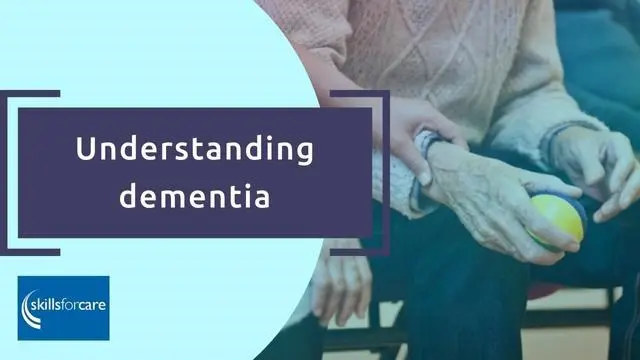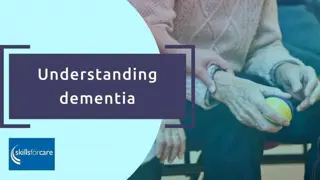
Understanding dementia (including younger onset dementia)
Course for health and social care practitioners or carers supporting someone with dementia
Laser Learning
Summary
- Reed Courses Certificate of Completion - Free
Add to basket or enquire
Overview
This course will help you learn how to recognise and understand what dementia means, to see the person and not the illness, and to find ways to help people live well. It also considers the importance of communication and how to help someone who is progressively losing their ability to communicate.
There is a common perception that dementia is related to ageing, but this is not always the case. Younger onset dementia is defined as dementia diagnosed before age 65. It can be diagnosed very early in someone’s 50’s, 40’s, or even as early as 30’s. This course contains information about the ‘Wellbeing’ model of dementia and how to support someone who has younger onset dementia to live well.
Achievement
Curriculum
Course media
Description
Learning outcomes
- The learner will understand the different forms of dementia and some of the common signs and symptoms
- The learner will know how to use the ‘Wellbeing’ model to support people living with dementia
- The learner will consider the experience of those living with younger onset dementia and the impact this can have on the person, and their friends and family
- The learner will be able to advise and support the families and friends of someone with this relatively common disorder
- For people with dementia, problems with communication can affect the care and support they receive. Learners will understand how best they can include people with dementia in their care plans and express their needs and preferences.
- Learners will be given tips for communicating with people who have dementia and ways they can communicate with people who cannot speak and/or have other sensory impairments
Advantages of this course
- In the UK, about 1 in 79 of the population will be affected by dementia so it is likely you will be supporting someone with dementia in your role as a health and social care professional and as such, will need to know how to provide the best possible care and help people live well. You may also need to know how to support a friend or relative with the disorder and the advice and information contained in this course will help you to do so.
- People with young onset dementia may still be working, responsible for a mortgage, have dependent children, and possibly dependent parents too. Their lives are likely to be active, with plans and hopes for the future. A diagnosis may result in a change / modification of roles within families and accepting support where once there was independence. This course will explore how to soften the impact of these changes and suggest ideas for increasing self-esteem and meaningful tasks and activities.
- A person with dementia may have trouble finding the right word, they may repeat words, or become 'stuck' on certain sounds. They are also likely to have other sensory impairments which can make it hard to communicate. Upon completion of this short course, learners will understand the affect dementia can have on communication and language.
- Autonomy as it relates to supporting someone living with dementia can seem a challenging goal. This course will explore how to encourage autonomy and reduce the risks of ‘learned helplessness’.
- Although dementia is a progressive condition, it’s the responsibility of caregivers to make sure every day counts. Upon completion of this course, learners will know how to facilitate joyful moments, live in the moment, and embrace opportunities for spontaneity and fun
- Website and video resources are used to explore the dementia journey in more detail. There is also suggested extra reading that gives both practical information and links to websites to expand knowledge
Laser Learning is a Skills for Care endorsed provider.
Who is this course for?
This course is ideal for those caring for a loved one, a care professional, or a practitioner in a supported living environment.
Requirements
A computer, mobile, or tablet and an internet connection
Questions and answers
Currently there are no Q&As for this course. Be the first to ask a question.
Certificates
Reed Courses Certificate of Completion
Digital certificate - Included
Will be downloadable when all lectures have been completed.
Reviews
Currently there are no reviews for this course. Be the first to leave a review.
Legal information
This course is advertised on reed.co.uk by the Course Provider, whose terms and conditions apply. Purchases are made directly from the Course Provider, and as such, content and materials are supplied by the Course Provider directly. Reed is acting as agent and not reseller in relation to this course. Reed's only responsibility is to facilitate your payment for the course. It is your responsibility to review and agree to the Course Provider's terms and conditions and satisfy yourself as to the suitability of the course you intend to purchase. Reed will not have any responsibility for the content of the course and/or associated materials.



